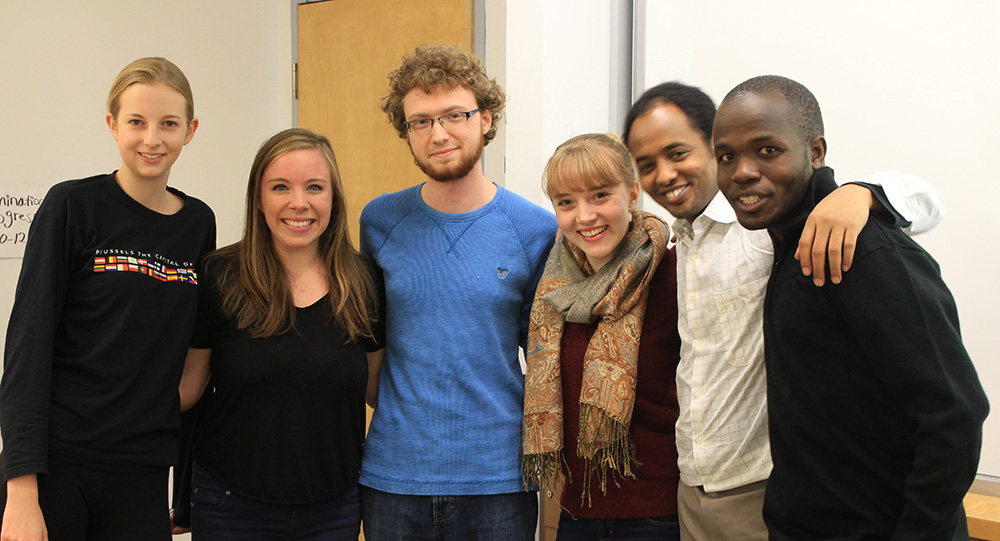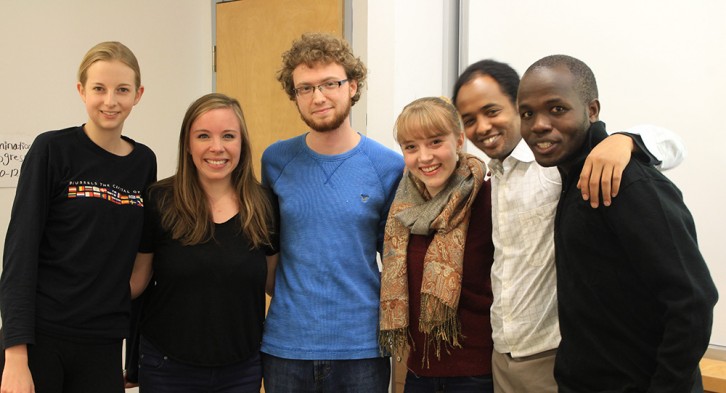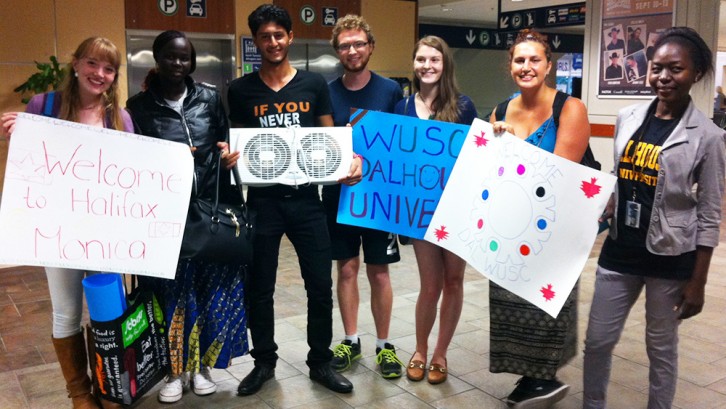STUDENT REFUGEES
Student refugees get a chance for higher education at Dalhousie
University seeks to sponsor more students through crowdfunding

caption
Members of WUSC Dalhousie at a meeting in November.
caption
Members of WUSC Dalhousie at a meeting in November.Dalhousie University is hoping to sponsor two student refugees through a crowdfunding campaign that began last week.
The campaign is looking to raise $24,000. Dalhousie president Richard Florizone kickstarted the campaign himself with a donation and promised to match every dollar donated.
Dr. Alain Boutet, executive director of the Office of International Relations at Dalhousie, said the crowdfunding campaign is partly in response to the Syrian refugee crisis, but also is an answer to the larger global refugee crisis.
“The question around refugees around the word is becoming more and more important and the Syrian crisis highlights this in a very significant way,” he said. “One of the key recommendations of the working committee on refugee crisis was to increase the support we can provide for the Dalhousie student refugee program. I think it’s going to be a significant contribution in trying to make the support and the increasing fund sustainable over the years.”
Boutet said the purpose of the crowdfunding was to give more visibility to the situation, but the effort won’t always be the solution.
“We need to find some mechanisms to support, in a sustainable way, the student refugee program,” he said.
Boutet said he thinks Nova Scotia will be willing to help Syrian refugees.
“I can feel that Halifax and its community and the province are really ready to welcome a certain number of refugees,” he said. “There’s a lot of work to be done, but I can feel that there’s a really strong mobilization of people. I’m pretty confidant that we will get there, even if fundraising is always challenging.”
Boutet said although Syrian refugees will have priority, the fund is ultimately for all student refugees and that will be taken into consideration.
How WUSC helps student refugees
Wenasa Alaraba is a student refugee from Kenya. She came to Dalhousie through an opportunity the World University Service of Canada (WUSC) gave her. She plans to work in Canada after she graduates. She wants to return to Kenya to inspire her siblings to pursue their education.
Read more about Wenasa Alaraba’s stroy.
“I want to tell them the fruits of working hard,” she says. “And of the opportunities you gain after graduating. I want to support them to further their studies.”
Emma Cruddas is the chair of WUSC’s Dalhousie chapter. She oversees the organization at the university, including selecting the applicants and getting them settled in Halifax. She said the crowdfunding campaign is a good opportunity for Dalhousie to help others.

caption
Members of WUSC Dalhousie welcome a student to Nova Scotia at Stanfield International Airport.“We’re all very excited about it,” she said. “We’re really trying to push it and get as much support as we possibly can because this is an opportunity we can’t miss. You don’t get that kind of opportunity every day.”
She said WUSC’s national office in Ottawa sends people out to do the interviews, then portfolios are sent to her.
“We look at things like the community that is already here,” Cruddas said. “We try to pick students who might know someone here on campus so they have a community before they arrive. As well, we try to make sure we have a gender balance in the selection process. We try to make sure we are including female students as well.”
WUSC Dalhousie also looks at the student’s academic interests to see if the university offers classes in those fields.
“If [they’re] interested in studying medicine in the future,” Cruddas said, “then it’s great to be able to sponsor students for their undergraduate here at Dalhousie because they might not have to transfer to a different province to do their medical degree later on.”
Alaraba said although she was happy to be selected, she knew what she was leaving behind in the Kakuma Refugee Camp in Kenya where she grew up.
“I couldn’t believe I actually made it beside all those other people,” she said. “It’s a dream come true. I was happy. I was celebrating. But knowing the fact that I was leaving behind some people that I am responsible for… That was on the negative side of it. But on the positive side I was happy I was getting the opportunity to pursue my higher education.”
Alaraba is currently preparing to enter the nursing program at Dalhousie. Complications during travel from Kenya to Halifax made her miss the deadline to apply to the program. She is taking science courses and intends to sign up as soon as possible.
Cruddas says the student refugees she works with are an inspiration to her. She said she is amazed by the effort Alaraba puts into her schoolwork, sometimes reading an entire textbook when a chapter would do. In Kakuma, Alaraba sometimes had to study by moonlight.
“I had the privilege of taking a class with Alaraba as well as getting to know her through the committee,” Cruddas said. “What’s really interesting is you learn about the ingenuity and tenacity of the students that come.”
Students sponsored through WUSC often aren’t able to return home to see their families until they become Canadian citizens.
“There’s a complete disconnect from everything they’ve known,” Cruddas says. “It’s amazing to see the hard work they’ve put in and knowing they’re not just getting an education for themselves but also for their families and communities.”

